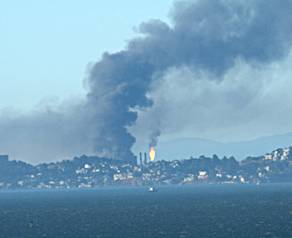Chevron cuts executive pay amid safety woes
 By DANIEL GILBERT and JOANN S. LUBLIN
By DANIEL GILBERT and JOANN S. LUBLIN
Chevron's board is cutting compensation for its chief executive and other top executives in the wake of a string of accidents and other operational problems since late 2011, according to people familiar with the matter.
Chevron's board on Wednesday trimmed equity awards by 11% and bonuses by at least 10% for CEO John S. Watson and several other executives, one of the people said.
"When things go poorly, the pay should reflect it," this person said. The directors "absolutely want to deliver a message to management."
Chevron has been performing well financially. But in February, the company disclosed it reduced the number of stock-options and performance shares awarded to Mr. Watson from last year, without revealing the bonus cuts or explaining the cause of the reductions.
Mr. Watson's 2012 compensation package was valued at $24.7 million, about half of which came from equity grants awarded the previous year.
The same equity awards, which are tied to how Chevron's stock performs, were reduced for four other top executives, according to filings with the US Securities and Exchange Commission.
Lloyd Avram, a spokesman for the company, said the board was still meeting.
"The company does not have a comment to provide until such time as the board meeting has concluded," he said.
Unlike other oil companies criticized in recent years for lavishly rewarding top brass, Chevron's executive pay practices have not prompted controversy among shareholders. An advisory vote on its compensation for 2012 was supported by 95% of votes cast at Chevron's annual meeting last year.
The San Ramon, Calif.-based energy giant has been leading its peers in profit and stock performance; shares are up 12% this year, outperforming larger rival ExxonMobil and its $233 billion stock-market value recently topped that of Royal Dutch Shell.
But Chevron has also suffered a string of operational setbacks since late 2011. Oil leaks from the seafloor at its Frade field off the Brazilian coast in November 2011 and March 2012 led the company to halt production there, forfeiting daily production of 29,000 bbl of oil and its equivalent in natural gas. The field has yet to restart and Chevron is still fighting the resulting legal quagmire.
In January 2012, a drilling rig in Nigeria operated by a Chevron subsidiary exploded, resulting in two deaths. And in August 2012, a huge fire broke out at its Richmond refinery after a badly corroded pipe ruptured. A state agency said in January it would seek fines totaling nearly $1 million for the incident.
Safety has become critical for oil companies operating under increasingly tough regulatory scrutiny, a concern heightened by the 2010 BP Gulf of Mexico oil spill.
Mr. Watson earlier this month touted Chevron's safety performance to analysts in New York, saying that its 250,000 employees had a total of 70 injuries that required them to miss a day of work last year.
"That's not just the best in the industry, it's world-class performance," he said, adding that the company still had room to improve.
Dow Jones Newswires






Comments